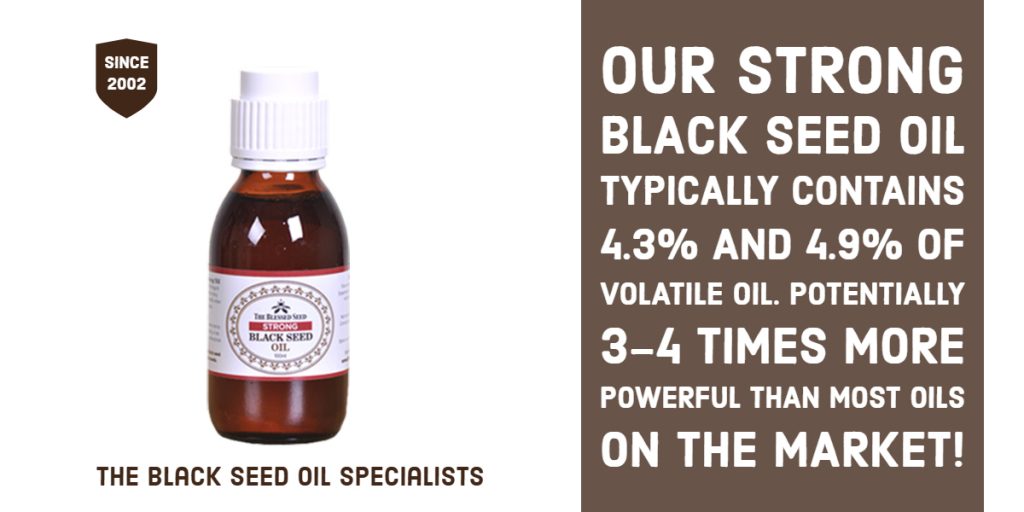Research
Research behind the power of black seed oil
Traditionally used for the promotion of good health and for many ailments, including:
- Fever
- Immune system
- Common cold
- Asthma
- Rheumatism
- Immune disorders
- Metabolic disorders
- Microbial infections
- Intestinal worms
- Cardiovascular complaints
- Headaches
- Skin disease
The traditional uses for Black seed have been the foundation for many of the research studies carried out thus far. There are few natural substances that have so much scientific validation of traditional claims. There are in excess of 800 research papers available covering 185 diseases and conditions.
Anti-inflammatory and anti-rheumatic
In February 1995, doctors at King’s College London, U.K. (1) tested Black seed oil’s use for rheumatism and inflammatory diseases.
They concluded that their studies supported the traditional use of Nigella sativa as a treatment for rheumatism and related inflammatory diseases. [1]
In 1960, Professor El-Dakhakny reported that black seed oil has an anti-inflammatory effect and that it could be useful for relieving the effects of arthritis.
In 2002, at the Alexandria Medical Faculty, Alexandria, Egypt he also studied the effectiveness of nigellone and thymoquinone whereby his research partly explained the mode of action of Black seed’s volatile oils in ameliorating inflammatory diseases. [2]
In 2001, doctors at Aga Khan University Medical College, Karachi, Pakistan, investigated the uses of the blessed seed for its bronchodilator and spasmolytic qualities.
Their studies concluded that the claims by traditional medicine about black seed’s usefulness for diarrhea and asthma appeared to be based on a sound mechanistic background. [3]
Immune system support
Black seed is a natural remedy that has been taken for centuries to promote good health and for the prevention of the common cold and asthma.
In 1986, Drs El-Kadi and Kandil at I.I.M.E.R. Panama City, Florida, investigated the effect of the blessed seed on the immune system and studied the effect of 1g taken twice daily in human volunteers.
They concluded, “These findings may be of great practical significance since a natural immune enhancer like the black seed could play an important role in the treatment of cancer, AIDS, and other disease conditions associated with immune deficiency states.” [4]
These results were confirmed by a study published in the Saudi Pharmaceutical Journal in 1993 by Dr Basil Ali and his colleagues from the College of Medicine at King Faisal University.

Mild black seed oil is great for individuals that are sensitive and children equally. Also those those who find it unpalatable. Good for starters!
Five antibiotics tested
In 1997 researchers at the Department of Pharmacy, University of Dhaka, Bangladesh, conducted a study to examine the antibacterial activity of the volatile oil of black seed compared to that of five antibiotics:
- ampicillin
- tetracycline
- cotrimoxazole
- gentamicin
- nalidixic acid
The oil proved to be more effective against many strains of bacteria, including those known to be highly resistant to drugs.
V. cholera, E. coli (a common infectious agent found in undercooked meats), and all strains of Shigella spp., except Shigella dysentriae.
Most strains of Shigella have been shown to rapidly become resistant to commonly used antibiotics and chemotherapeutic agents.
HIV/AIDS
Dr. Haq in research on human volunteers at the Department of Biological and Medical Research Center in Riyadh, Saudi Arabia showed that black seed enhanced the ratio between helper T-cells and suppresser T-cells by 55% with a 30% average enhancement of the natural killer cell activity.
These results are effective enough to consider the oil being used in the treatment of HIV and the findings of this paper caught the attention of the Archives of HIV AIDS where they were duly published.
Analgesic agent
In 2001 at King Faisal University, Saudi Arabia, Dr Al-Ghamdi investigated black seed’s anti-inflammatory, analgesic and antipyretic activities.
He concluded, “This study, therefore, supports its use in folk medicine both as an analgesic and anti-inflammatory agent and calls for further investigations to elucidate its mechanism of action.”
The anti-inflammatory effects were also supported by research in 2003 at the King Saud University, Saudi Arabia.

Anti-biotics
In 2005 at King Faisal University, Al-Ahsa, Saudi Arabia they studied the effects of black seed in conjunction with the antibiotic oxytetracycline (commonly used to treat infections of the respiratory and urinary tracts) in pigeons
They concluded the addition of Black seed to the feed of pigeons could act as an immunoprotective agent when the chronic administration of antibiotics is considered. [ref]
Black seed oil capsules offer a convenient alternative to those who want to enjoy the many health benefits of black cumin oil completely fuss and mess free.
Respiratory System

Anti-cancer
Extracts of black seed have been patented to increase immune function during chemotherapy (ref ).
One must note that this is not a black seed as a whole. It is an extract.
It is worth giving this information to your physician, who may consider it as helpful.
Studies have demonstrated that Nigella Sativa and its active component thymoquinone have widespread cytotoxic activity against various cancer cell types. Black seed has anti-tumor properties that involve inhibition of DNA synthesis, angiogenesis and fibrinolytic potential of malignant cells but it also has antioxidant, anti-inflammatory and immuno-potentiating properties. As oxidative stress and inflammation contribute to malignancy, black seed is a powerful weapon against cancer. Additionally, it does not affect healthy cells whereas conventional chemotherapy indiscriminately kills healthy and malignant cells whilst weakening the immune system.
A healthy immune system will detect and destroy cancer cells before cancer endangers the life of the patient. Therefore black cumin seed oil is an ideal candidate for use in keeping your immune system strong enough to nip serious diseases in the bud.
Breast cancer
In 2003 at the Jackson State University, USA, researchers interested in how Black seed had been effectively used for centuries for such a wide variety of acute ailments decided to study how Black seed fared against cancer.
They exposed breast cancer cells to black seed extracts. The cancer cells were inactivated, leading the scientists to conclude that Black seed held great promise in the fields of prevention and treatment of cancer. [5]
Cancer of the colon
In the same year, doctors at Osaka City University Medical School in Japan tested black seed for cancer of the colon. They showed that the blessed seed inhibited the growth of cancer in the post-initiation stage. [6]
In 2004 at the American University of Beirut, Lebanon, thymoquinone extracted from black seed was investigated to see if it triggers apoptotic cell death in human colorectal cancer cells. They concluded that thymoquinone has the potential for the treatment of colon cancer.
Anti-tumor effects
In 1991 studies at the Amala Research Center in Kerala (India) confirmed the use of black seed oil as an anti-tumor agent. [7]
A second common type of cancer cell, Dalton’s lymphoma ascites (DLA) cells were also used. Mice which had received the EAC cells and black seed remained normal without any tumor formation, illustrating that the active principle was 100% effective in preventing EAC tumor development.

Anti-fungal; anti-bacterial (candida)
In 2003 the antifungal activity of Black seed was studied at the Aga Khan University Medical College, Karachi, Pakistan. Mice were inoculated with Candida, infecting the spleen, liver, and kidneys.
Extracts from black seed were fed to the mice, which caused a considerable inhibitory effect on the growth of the organism in all organs.
They concluded that the aqueous extract of black cumin seed exhibited an inhibitory effect against candidiasis, and that the traditional use of the plant in fungal infections was valid. [8]
In 2005, in the Pakistan Journal of Medical Science, a paper was published about the antibacterial and antifungal effects of black seed when tested against a standard and hospital strains of Candida albicans, coagulase-positive Staphylococcus aureus (CPSA) and Pseudomonas aeruginosa.
They were also investigated and compared with standard drugs, clotrimazole (an anti-fungal ointment used to topically treat vaginal candidiasis and candida of the scrotum and anus.), cloxacillin (a semi-synthetic antibiotic in the same class as penicillin.) and gentamicin (an antibiotic.) respectively.
The results confirmed other studies that demonstrated the antimicrobial activity of black seed extracts against a broad range of microbes and especially on multiple antibiotic-resistant bacteria. [9]

Diabetes
In 2002 at the Gifu University, Japan, studies concluded that black seed may be of significant value to sufferers of type 2 Diabetes. [10]
In1991 at Kuwait University, the mechanism of action was studied for black seed whereby they concluded that extracts may prove to be a useful therapeutic agent in the treatment of non-insulin dependent diabetes mellitus.
In 2003 three faculties in Van, Turkey came together and confirmed that black seed brought the lowered sugar level back to the control level in diabetic rabbits.
In 2004 at the Faculty of Medicine, Zonguldak Karaelmas University, Zonguldak, Turkey they tested the effects of Nigella sativa on diabetic rats.
They concluded that black seed helps in diabetes by exerting a therapeutic protective effect.
More recent research has revealed Black seed oil is one of the very few substances that can help prevent both type-1 and type-2 diabetes. It has been found to increase serum insulin and improve insulin sensitivity as well as decrease insulin resistance and fasting blood sugar levels. Not only has it been found to increase beta-cell function in the pancreas but also to stimulate partial regeneration of these cells.
Metformin is one of the most commonly prescribed drugs for type 2 diabetes but it comes with side effects like muscle pain, heartburn and indigestion. Black seed improves glucose tolerance as effectively as metformin, without adverse effects because of its very low toxicity. Unlike pharmaceutical drugs, black seed works on many different levels. “Antidiabetic activity of N. sativa is mediated through its multiple pharmacological actions.” [11]
Thrombosis
Hematological studies on black seed oil were made in 2001 at the Meiji Pharmaceutical University, Tokyo, Japan. They concluded that there was more potent activity than aspirin, well known as a remedy for thrombosis. [12]
Cestodes (worms) in children
In 1991 at the University of Agriculture, Faisalabad, the anticestodal effect of Black seed was studied in children who had been naturally infected. They concluded that black seed contained active principles effective against these worms. [13]
In 2007, Abdulelah and Zainal-Abidin investigated the anti-malarial activities of different extracts of nigella Sativa seeds against P. berghei. Results indicated strong biocidal effects against the parasite. [14]
Black seed was found to have an anthelmintic activity against tapeworm comparable to that of piperazine. The pure essential oil showed activity against Monezia in sheep comparable to niclosamide.
Learn more about the dosage and black seed oil benefits.

Volatile black seed oil actions and effects explained.